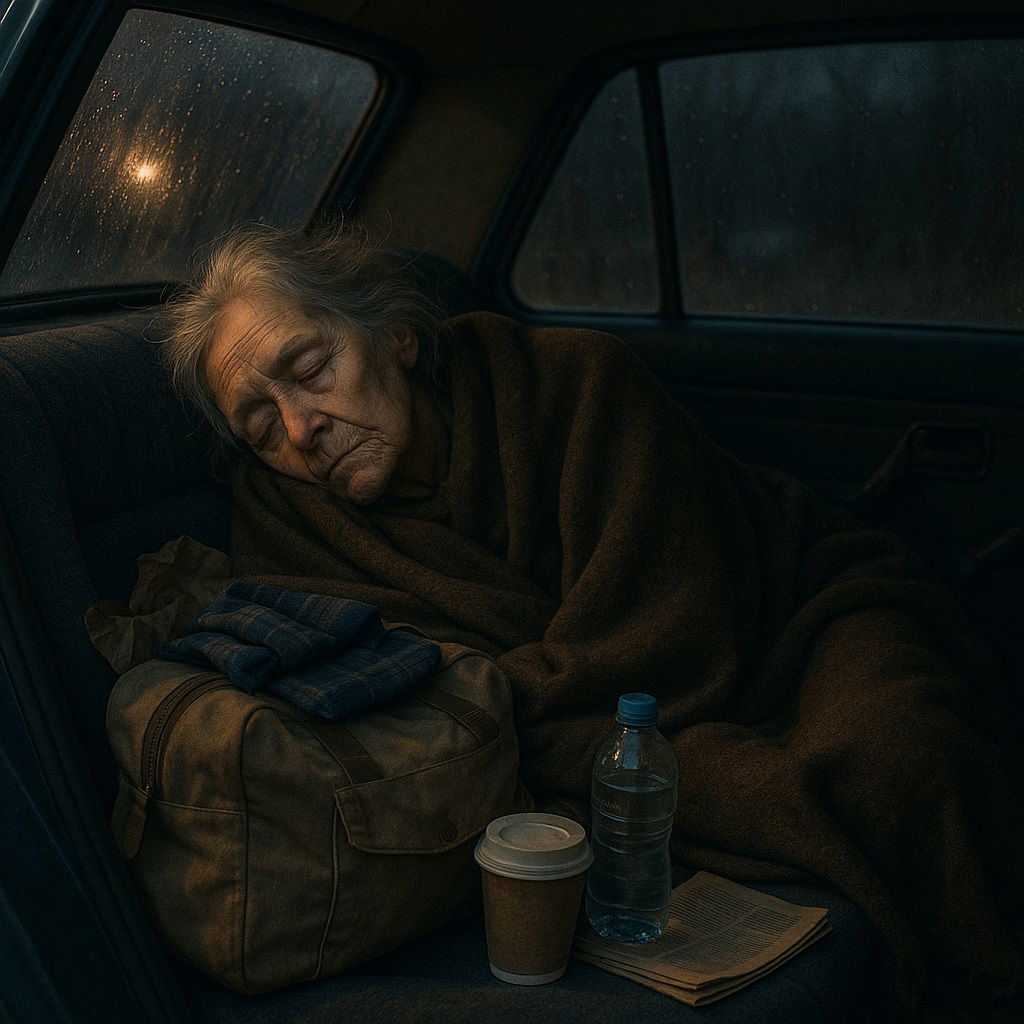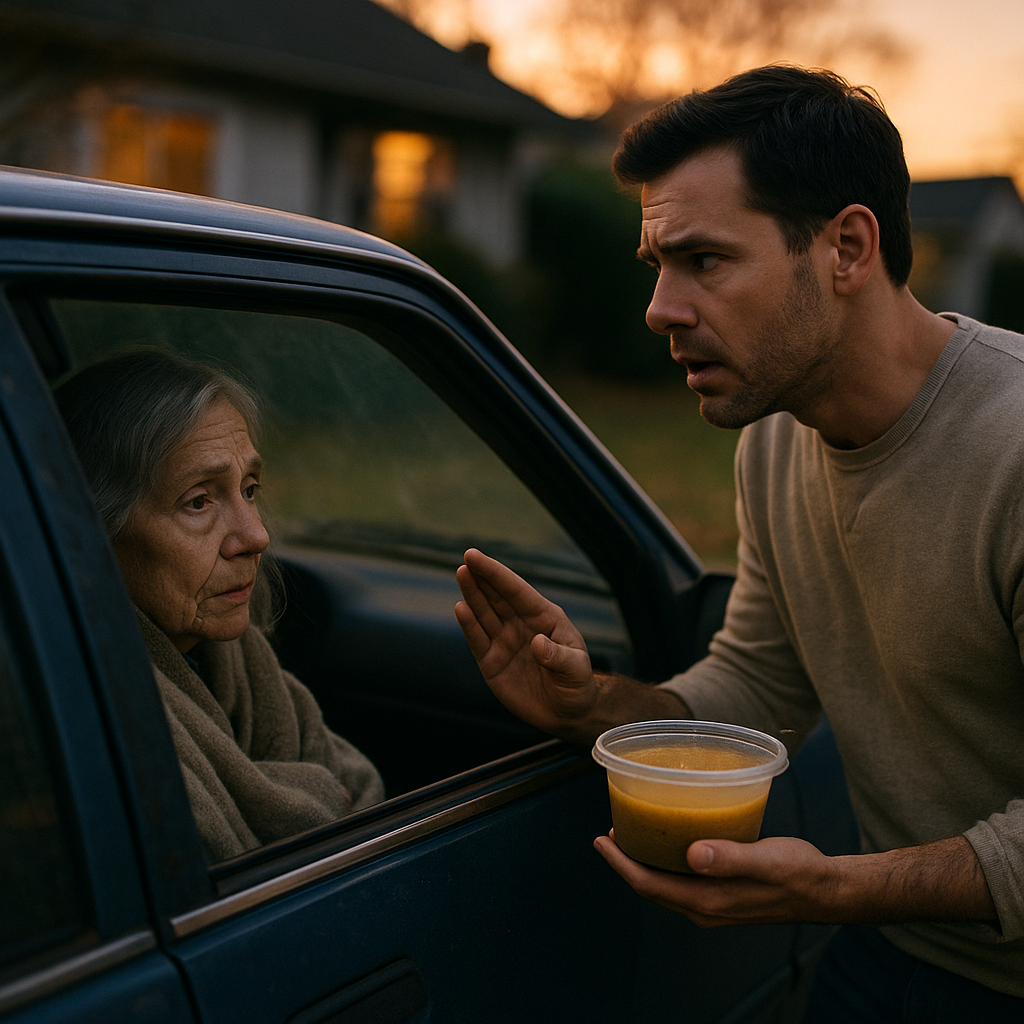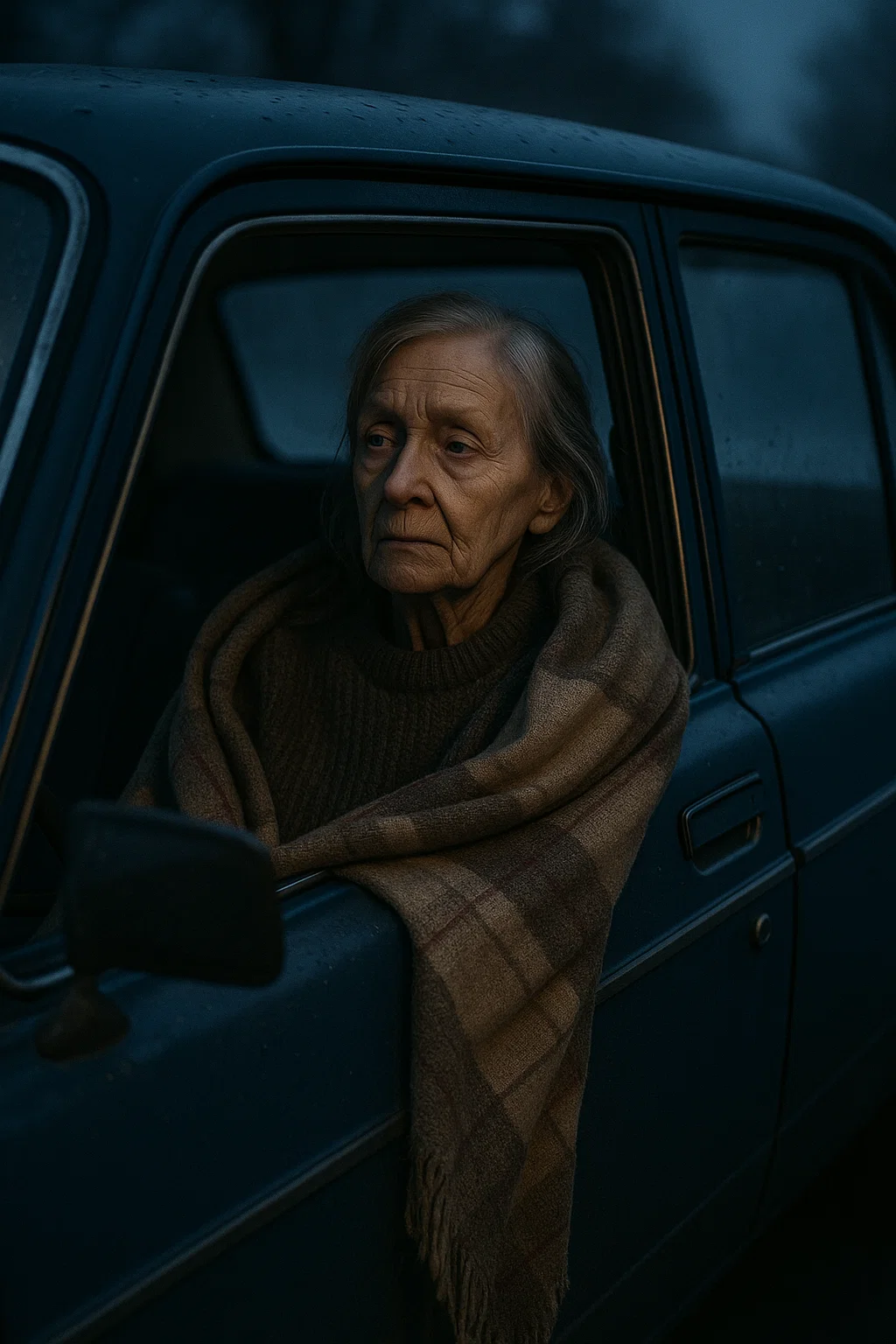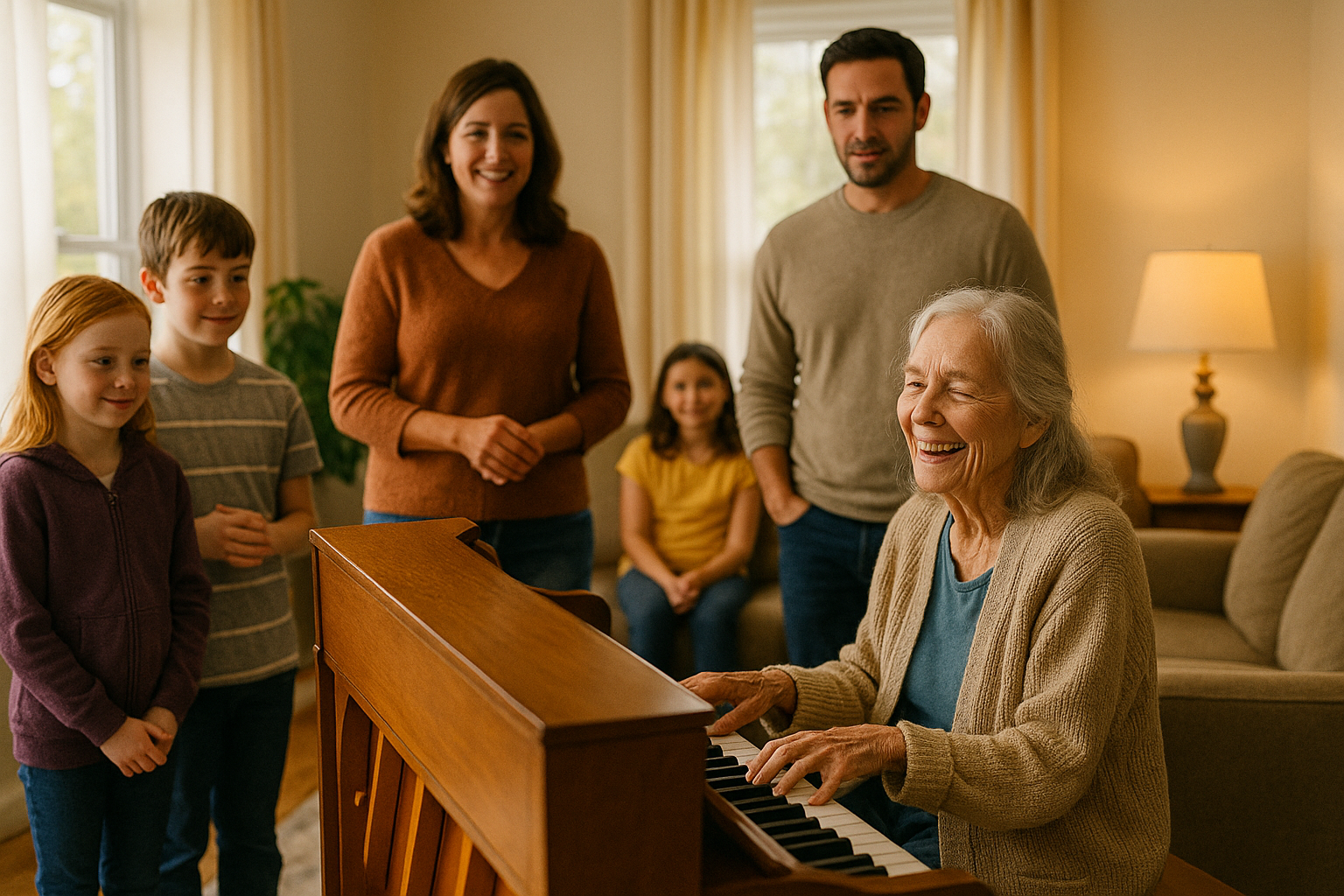My name is Daniel Collins. I live on a quiet tree-lined street just outside Portland, Oregon. It’s the kind of neighborhood where people smile but keep their distance, where you know faces but not names, and nobody asks too many questions.
That’s how it was with my elderly neighbor, Mrs. Rose Whitaker.
She lived directly across the street in an old, weathered two-story house with fading yellow paint and a porch that sagged slightly in the middle. I’d see her every now and then, sweeping leaves, feeding the birds, or tending to the small rose bushes along her fence. She always wore a hat, always smiled, and always seemed so put-together — like a retired schoolteacher or librarian who never forgot her manners.
But something didn’t sit right.

It started with the car. A navy-blue sedan that looked like it belonged in the early 2000s. For months, it hadn’t moved from the curb, parked just outside her house. I assumed it was broken down. But then I noticed little things. A light flickering inside at odd hours. The silhouette of a person in the driver’s seat around midnight. Once, I spotted condensation on the windows early in the morning — the kind that forms when someone’s been breathing inside a sealed car overnight.
Then, one cold October evening, everything changed.
I’d gotten home late from work and was hauling groceries into the house when I saw her — Mrs. Whitaker — inside that car. Wrapped in a heavy blanket, her silver hair slightly disheveled, reading by the faint glow of a flashlight.
My heart dropped.
I stood there frozen, holding a bag of oranges in one hand, keys in the other.
What on earth was she doing in there?
She had a house — I could see the porch light glowing behind her — so why was she curled up in the backseat of an aging car like someone who had nowhere else to go?
That night, I barely slept. I kept glancing out the window every hour. The flashlight had gone out. The blanket remained motionless.
I felt sick.
The next day, I walked across the street carrying a container of hot beef stew and a freshly baked sourdough roll. My hands trembled a bit as I knocked on her car window.
She stirred, slowly waking, then rolled it down with the same calm grace I’d seen a hundred times before.
“Daniel,” she said with a gentle smile. “What brings you over this early?”
“I, uh… made too much stew,” I lied. “Thought you might like some.”
“Oh, that’s very sweet of you. Thank you.”
“Mind if I sit with you for a bit?” I asked.
She hesitated, just for a second, before unlocking the passenger door.

We sat in silence as she sipped the stew, savoring every bite like it was the best thing she’d had in weeks. When she finished, she folded her hands in her lap and stared out at the street.
“I suppose you’ve got questions,” she said softly.
“I don’t want to intrude,” I replied. “But… why are you sleeping out here?”
She let out a long breath, her eyes misting over.
“My husband, Harold, passed away four years ago,” she began. “Cancer. Quick and cruel. After that, everything changed. The house… it became too quiet. Too full of memories. Every room echoed with his absence.”
I listened quietly.
“But more than that,” she continued, “the plumbing broke last winter. The heater failed. The roof started leaking. I tried to keep up with repairs, but the bills piled up. My pension barely covers groceries and medications. I applied for some assistance, but the paperwork overwhelmed me. The house became unlivable… and I couldn’t afford a motel.”
I swallowed hard. “Why didn’t you tell someone? Anyone?”
She smiled bitterly. “Because I’m old, Daniel. And pride is a stubborn companion. I didn’t want to be a burden. I didn’t want people to see me as helpless. So I stayed quiet.”
Her voice cracked then, and she quickly dabbed her eyes with a crumpled tissue.
I felt a knot form in my chest.
“Mrs. Whitaker,” I said gently, “you don’t have to live like this. Let me help.”
She shook her head. “It’s not your responsibility.”
“Maybe not. But I can’t just pretend I didn’t see this.”

That night, I made calls. Lots of them. First to Jeremy, an old high school buddy who ran a construction company. Then to the city’s senior services hotline. Then to a local church I’d passed a thousand times but never once entered. I didn’t know what I was doing — I just knew I had to do something.
The next morning, I knocked on her car again.
“We’re getting your house fixed,” I said.
She blinked at me. “What?”
“My friend Jeremy’s coming over this weekend to check the roof and pipes. I already spoke to the city. There’s a grant you qualify for — we’ll get the paperwork sorted.”
Her lips trembled. “You did all that… for me?”
I nodded. “And there’s more. I found a temporary apartment in a senior housing complex. Just for a few weeks, until everything’s repaired. It’s warm. Safe. No car required.”
Tears streamed down her cheeks. “I don’t know what to say.”
“Say yes.”
She did.
The next few weeks were a blur. Jeremy and his crew repaired the roof, fixed the heater, and replaced corroded pipes. Volunteers from the church helped clean up the inside — dusting, scrubbing, even repainting the walls. Sarah, a retired nurse from the congregation, started visiting regularly, bringing home-cooked meals and books to read with Mrs. Whitaker.
I visited her temporary apartment often. She’d always make tea and ask about my day like an old friend. And slowly, she started to open up — not just about her late husband, but about her life. She had once been a music teacher. Played piano beautifully, she said. Had no children of her own, but countless students who still sent her Christmas cards.
One night, as we sat on her small balcony under a clear sky, she turned to me and said, “You didn’t just fix my house, Daniel. You reminded me I still matter.”
That hit me harder than I expected.
Because until all this began, I’d lived a fairly isolated life. My parents were gone. No siblings. No partner. I worked, I came home, I kept to myself. But now — with Mrs. Whitaker, Sarah, Jeremy, and even the folks from the church — I felt like I was part of something again.
Six weeks later, the house was ready.
We threw a surprise “Welcome Home” party for her. Nothing fancy — just cookies, cider, and a few neighbors. Someone brought a potted plant. Sarah brought cupcakes. And when Mrs. Whitaker walked through her front door, she stopped in the entryway and gasped.
Her house, once crumbling and cold, now smelled of lavender and fresh paint. The living room glowed with soft light. A crocheted blanket lay neatly folded on the new couch. The framed photo of her and Harold sat on the mantel, just as she’d left it — now surrounded by warmth instead of shadows.
She cried. We all did, honestly.
And then she did something none of us expected.

She sat down at the old upright piano in the corner — one I hadn’t even realized was there beneath all the clutter weeks before — and began to play.
A slow, sweet melody filled the room. Her fingers, though a little shaky, danced across the keys like they remembered every note. It was a love song, soft and aching. When she finished, we clapped.
“I played that at my wedding,” she whispered.
That night, after everyone left, I helped her settle in. As I was about to leave, she caught my hand.
“You didn’t just save my home, Daniel,” she said. “You brought me back to life.”
I didn’t know what to say. So I just squeezed her hand and smiled.
It’s been over a year now. Mrs. Whitaker no longer sleeps in her car. The old sedan still sits outside, but now it’s just a car — not a shelter.
She volunteers at the community center every Wednesday, teaching piano to kids whose parents can’t afford lessons. Sarah visits her twice a week. Jeremy stops by sometimes just to share a cup of coffee. And me? I walk over every Friday night. We share dinner, talk about life, and sometimes she plays me music that sounds like memories.
I used to think being a good neighbor meant mowing your lawn and waving from the porch.
Now I know it means seeing what others ignore.
Listening when it’s uncomfortable.
Showing up when it’s easier to walk away.
Because sometimes, behind a drawn curtain or a fogged-up car window, there’s someone silently crying out for help.
And if you’re lucky — truly lucky — you might just be the one who hears them.


